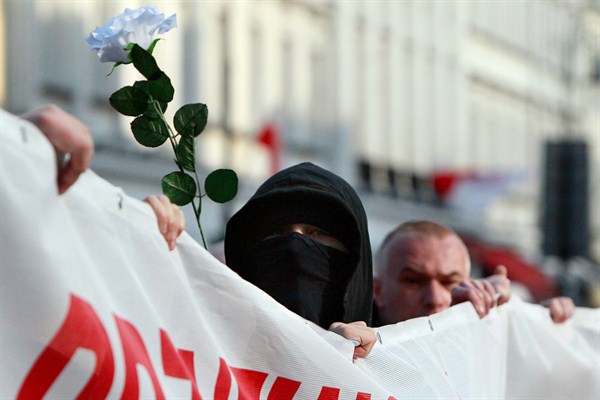With nationalist sentiment simmering across the continent, Europe has become the site of an ideological divide the likes of which has not been seen since the Cold War. The enlargement of the European Union was a driving force behind the spread of democracy into the former communist-bloc countries in the two decades following the collapse of the Soviet Union. But the emergence of illiberalism in the east combined with a surging far right in the west has threatened to reverse that momentum. WPR has compiled 10 articles to outline the current state of democracy in Europe.
Purchase this special report as a Kindle e-book.
Illiberalism Haunts the East
Is Poland Becoming the European Capital of Xenophobia?
Poland’s authoritarian turn has adopted some ugly undertones. An annual march on the country’s Independence Day has become a magnet for ultranationalists from across Europe; the one held last November drew 60,000 neo-fascists into the streets. If a major European country becomes a hub of far-right radicalism, wrote Frida Ghitis at the time, the implications for Europe and the West would be alarming.
Orban’s Aggressive Maneuvers in Hungary Carry Short Gains and Long Risks
Hungary’s controversial prime minister, Viktor Orban, is facing down international criticism and working to consolidate control ahead of April’s general elections. While the leader has a strong autocratic streak, his grip on power may not be as strong as it once was. Andrew MacDowall argued in December that Orban’s populist grandstanding risks leaving Hungary on the political fringes in the not-too-distant future.
Will a Populist Firebrand’s Re-Election Help End a Czech Political Stalemate?
Shortly after populist billionaire Andrej Babis won the premiership during general elections in October, Czech voters re-elected another populist, the anti-immigrant President Milos Zeman, in January. Tim Gosling noted at the time that while Zeman’s victory will be lamented in European capitals, the fog that has enveloped Czech politics since last fall could now start to dissipate a little.
Slovakia Tries to Mask Its ‘Oligarchic Democracy’ With Strong EU Ties
The landslide electoral victory in the Czech Republic by Andrej Babis’ party was also a high-profile example of the dominant role played by powerful oligarchs in Central European politics. In neighboring Slovakia, Dariusz Kalan explained in November, that influence has been exercised behind the scenes for nearly 25 years, despite a host of overtures to the EU meant to portray the country as a democratic stalwart.
Ukraine’s Own Government Is Trying to Derail the Fight Against Corruption
It isn’t uncommon to hear in Ukraine today that President Petro Poroshenko is no less corrupt than Viktor Yanukovych, the Kremlin-linked leader who was ousted in the 2014 Maidan revolution. Jordan Gans-Morse explained last month why Ukraine’s campaign against corruption—the root of many of its political ills—is facing tough times, with implications beyond Kiev.
The West Holds On
Will Germany’s Social Democrats Take One More Chance on a Grand Coalition?
Five months after a strong electoral showing by the far-right Alternative for Germany party, or AfD, ushered in a period of political uncertainty, Germany is finally getting a new government. At least, wrote Andrew Green last month, that’s what the country’s leaders are hoping for. Chancellor Angela Merkel’s conservative bloc has struck a deal to govern with the center-left Social Democrats, but the pact has yet to be formally ratified and could set the stage for future political headaches if it is.
Will a Weakened Merkel Doom Macron’s Hopes for EU Reform?
After the initial round of negotiations to form a coalition in Germany collapsed last November, Chancellor Angela Merkel was left in a state of political suspended animation. WPR Editor-in-Chief Judah Grunstein explained at the time why Merkel’s weakened position in Berlin is also troublesome for French President Emmanuel Macron’s plans to reform France and the EU, a key part of his plan to counter far-right nationalists at home and elsewhere in Europe.
Fear of Wilders Binds the Disparate Parties in the New Dutch Government
After Dutch voters fended off far-right populist Geert Wilders in elections last March, it took more than 200 days for an agreement to be reached to form a new government in the Netherlands. After that deal was finally struck in October, Frida Ghitis argued that its substance points to a coalition that remains weak and vulnerable.
What Finland Can Teach the West About Countering Russia’s Hybrid Threats
Many European governments only recently woke up to the threat to democracy posed by Russia’s newer hybrid warfare tools, wrote Mackenzie Weinger in an in-depth article last month. But Finland has spent years trying to render them ineffective, with some success. A newly formed research and strategy unit in Helsinki is an effort to share that experience with fellow EU members as well as NATO states.
As Europe Moves Right, Portugal Veers Left—and Thrives
Trish Lorenz penned an in-depth article in January explaining why Portugal has been spared the far-right fervor found elsewhere in Europe. Since taking power in 2015, Portugal’s Socialist Party has exploited favorable economic tailwinds to craft an effective political narrative about rolling back austerity. It’s unclear, though, whether the party’s success offers lessons for leftists elsewhere in Europe who are losing ground in the current political environment.

